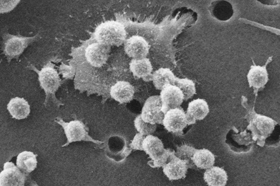by
Nancy Ryerson, Staff Writer | February 14, 2013
A tumor's texture may help doctors determine how a patient is responding to chemotherapy, a new study presented at the 2013 Cancer Imaging and Radiation Therapy Symposium found. The study analyzed CT scans of esophageal cancer tumors after chemotherapy treatment, and discovered that the shape of the tumor was an indicator of the patient's life expectancy.
Researchers looked at the post-treatment CT scans of 31 esophageal cancer patients who received chemotherapy between 2007 and 2010. The scans were done before platinum and fluorouracil-based chemotherapy and then again after a median of 21.9 months.
Primary tumor texture parameters were measured and analyzed both times using TexRAD, proprietary software that enhances the images to reveal details not visible to the naked eye by examining the relationships between pixels.



Ad Statistics
Times Displayed: 109404
Times Visited: 6640 MIT labs, experts in Multi-Vendor component level repair of: MRI Coils, RF amplifiers, Gradient Amplifiers Contrast Media Injectors. System repairs, sub-assembly repairs, component level repairs, refurbish/calibrate. info@mitlabsusa.com/+1 (305) 470-8013
The CT scans showed that the tumors became more homogenous after chemotherapy, as entropy decreased. Those tumors that became the most symmetrical following treatment were associated with longer survival — 36.1 months instead of 11.1 months.
Prognosis for esophageal cancer is often grim, with surgery as the most common treatment for the disease in its later stages.
“Esophageal cancer is associated with poor outcome, and the incidence of esophageal cancer is increasing, especially in the West,” said study leader Connie Yip, M.D., during a presentation at the Cancer Imaging and Radiation Therapy Symposium on February 9. “There is an urgent need to improve assessment for this group of patients.”
Though the study was small, the authors hope further research will help doctors decide when surgery is appropriate for esophageal cancer and for other diseases in the future.
"As a biomarker for treatment efficacy, this technique could save patients from unnecessary surgery and provide more definitive guidance in developing patient treatment plans with improved outcomes," said Dr. Yip in a press release.

